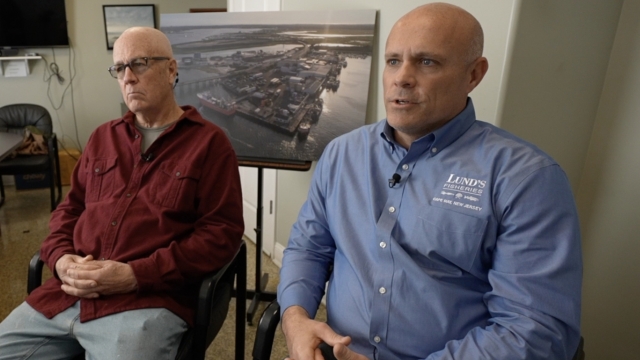A case that started as a mere glimmer along the New Jersey coast floated all the way to the steps of the Supreme Court Wednesday, as Supreme Court Justices wrestled with the question of government regulation.
"Isn't it sort of impractical and chaotic to have a world in which every undefined term in a statute is subject to litigation if you're trying to govern?" said Justice Amy Coney Barrett.
For years, fishermen have been required to take federal observers on their boats when they set out into the North Atlantic in search of herring.
Those observers are making sure fishermen's boats are fishing where they're supposed to and catching what they're legally allowed. But back in 2020, federal regulators moved to require herring fishermen to directly pay the observers' salaries.
So Bill Bright and Wayne Reichle sued the federal government and sat down with Scripps News last year.
"From the beginning the most important thing for us was the ability to continue fishing and continue operating the way we've operated for a number of years," said Reichle.
SEE MORE: A group of commercial fishermen have ended up before the Supreme Court
A ruling in their favor could drastically change not only commercial fishing but how the federal government oversees nearly every industry in the country — overturning the Chevron doctrine.
Established in 1984, the Chevron doctrine says that when a law is silent about what is required in a specific situation, federal courts must defer to regulatory agencies like NOAA or the EPA.
The 40-year-old decision is among the most frequently cited high court cases in support of regulatory power.
"We do delegate to agencies from the beginning of the founding of interpretation. I'm at a loss to understand where the argument comes from," said Justice Sonia Sotomayor.
Many Justices seemed skeptical about overturning a case which has for decades set legal precedent.
Former U.S. Solicitor General Paul Clement argued the case for the fishermen Wednesday and spoke to the media afterward.
"This is an incredibly important case about the separation of powers and how we allocated authority," said Clement.
Gun, e-cigarette, farm, timber and home-building groups are all among the business groups supporting the fishermen. Environmental and health advocacy groups are urging the court to leave the Chevron decision in place.
"None of us would be here if not for our clients who had the gumption to stand up to agency overreach," said Clement.
A ruling on the case is expected sometime this summer. Meanwhile, fishermen across the U.S. will wait and see if this case takes a bite out of federal regulatory power.
Trending stories at Scrippsnews.com




